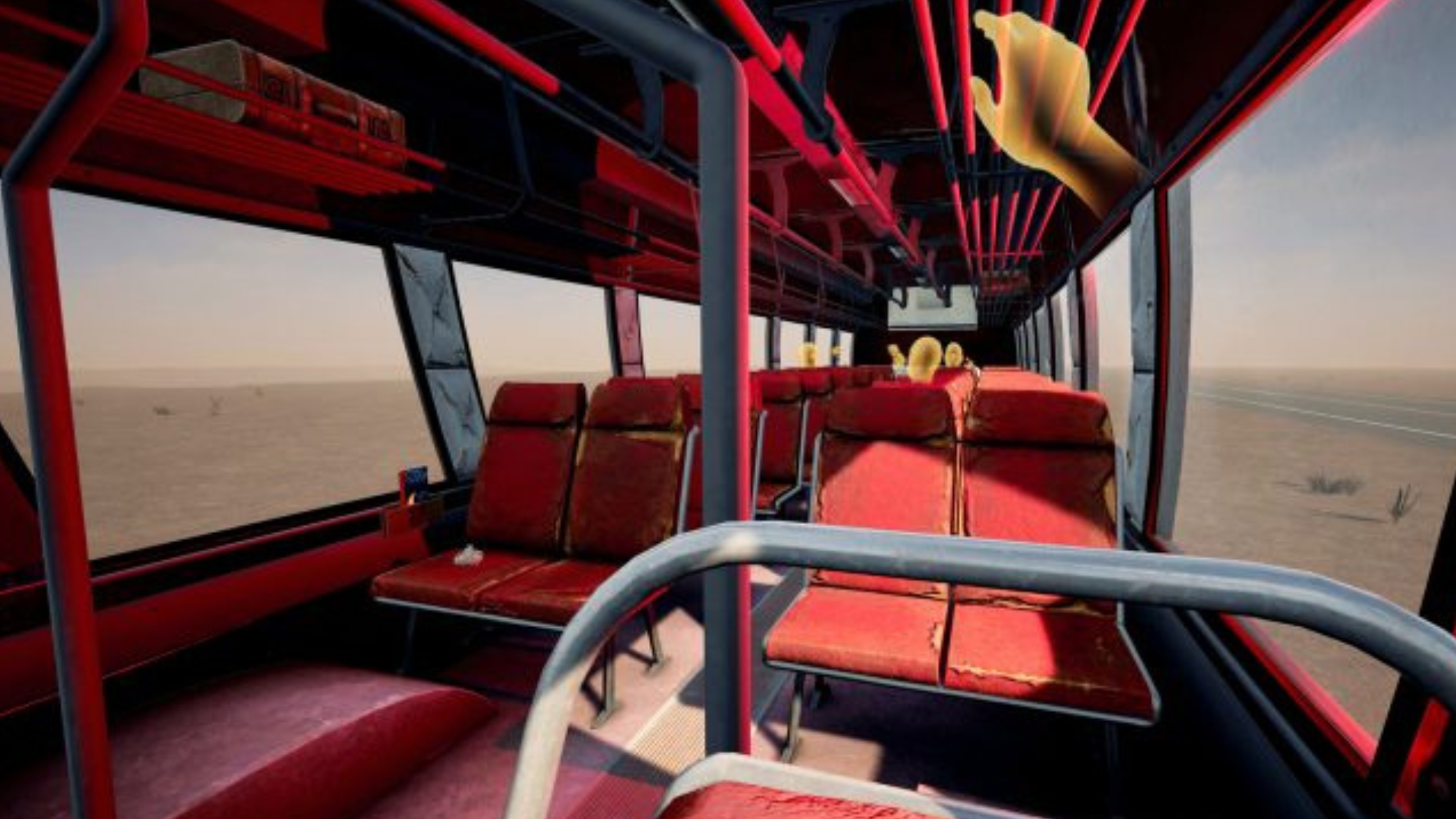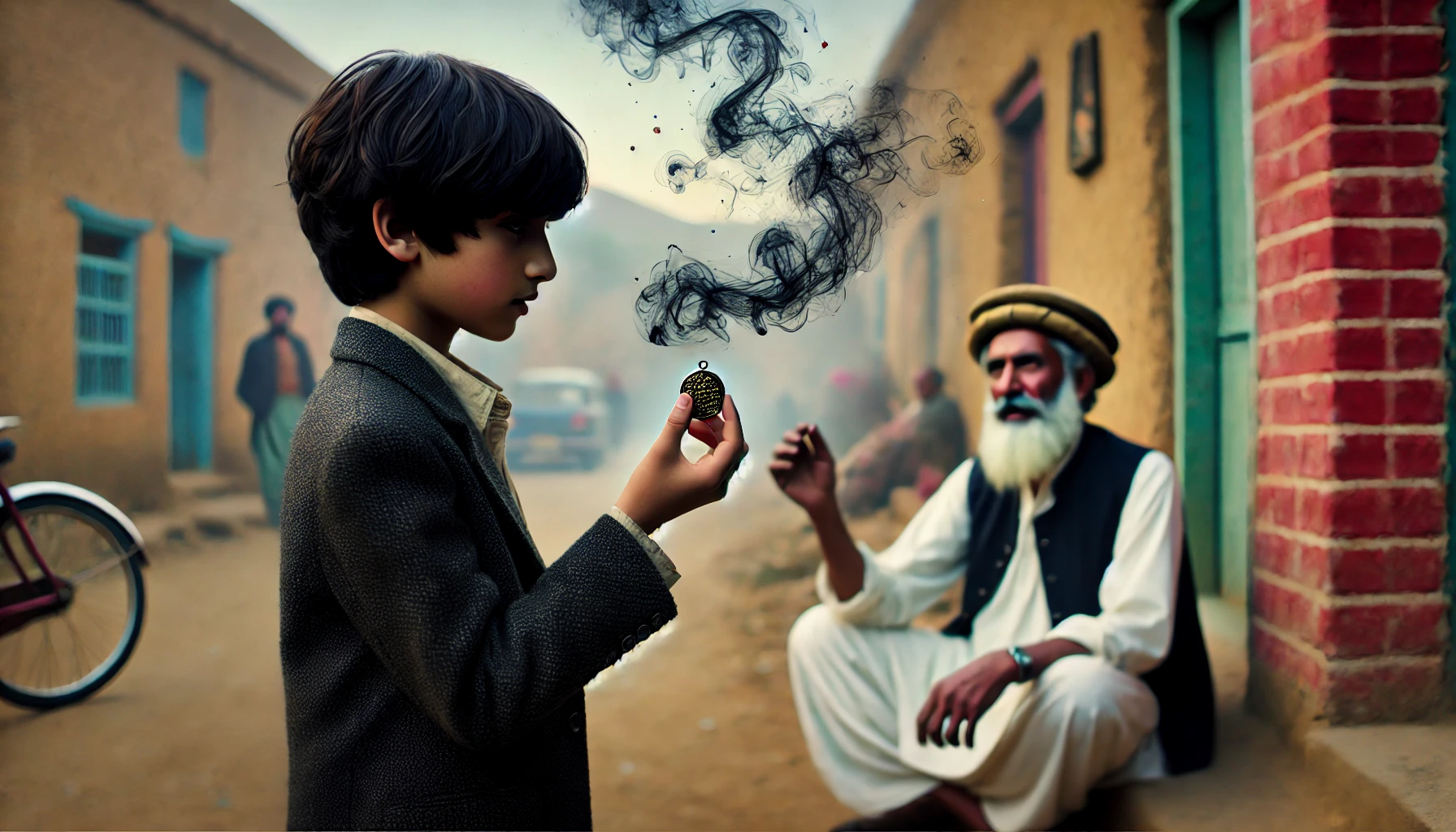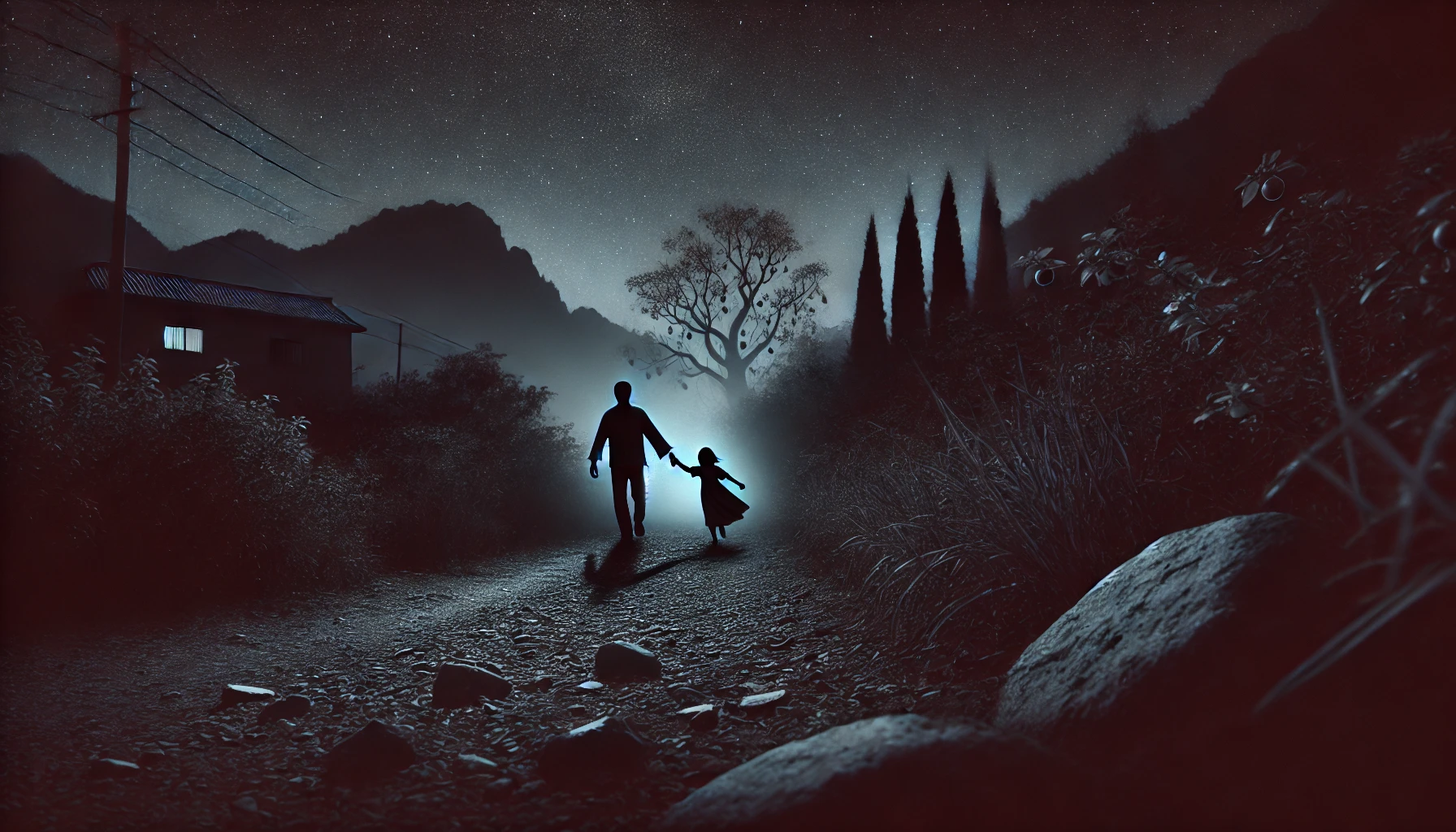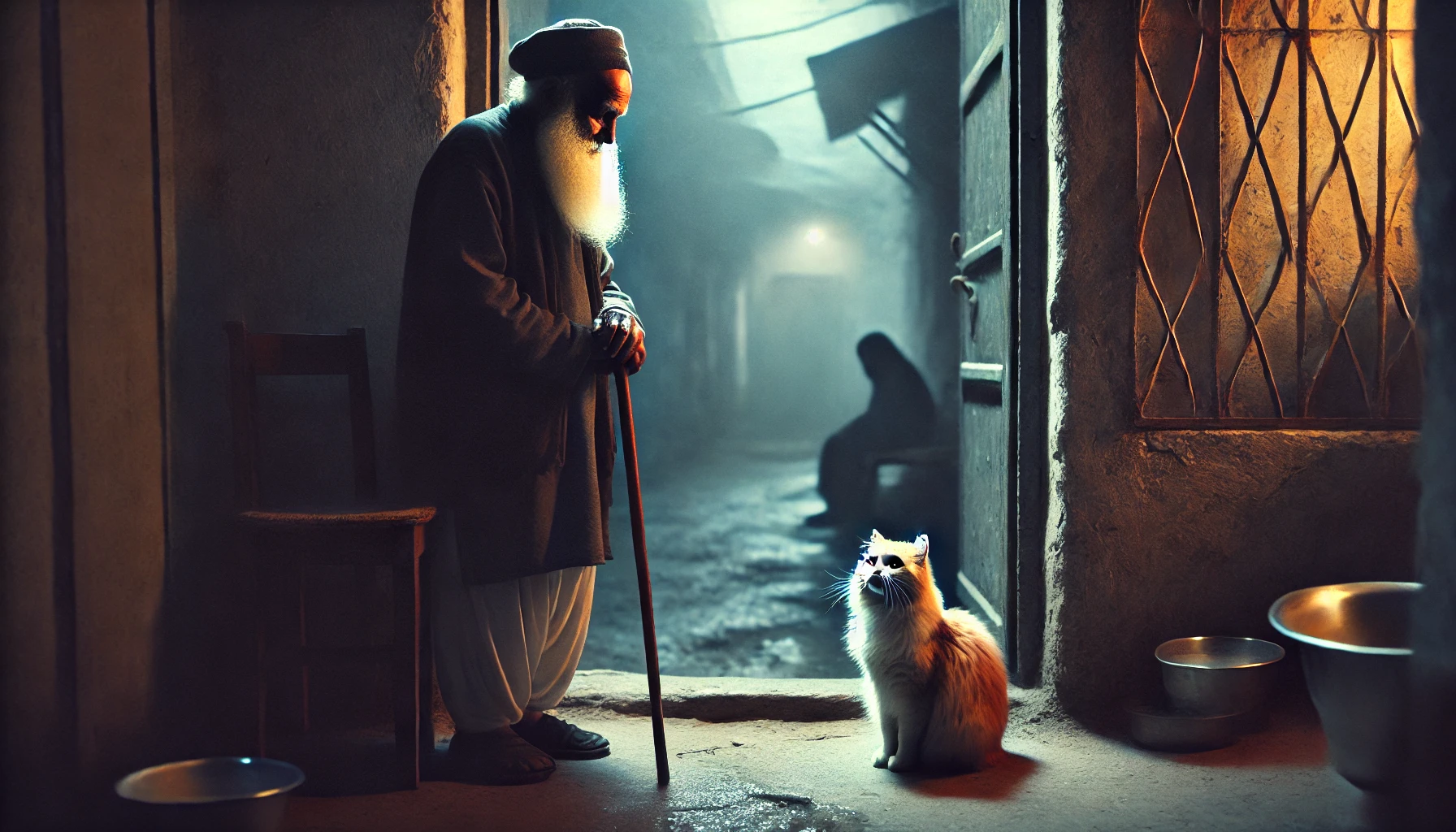
Endless Road, Endless Night
Written by Sharaf Shad
The bus was jiggling along a bumpy road. It was past midnight and the passengers were asleep or half-dozing in their seats. Only two people were awake. One was the driver who was playing an old Indian song on the radio as he tried to avoid the potholes in the road. The other was a passenger lost in thought.
The bus was crossing a wide plain at the foot of a mountain. Some scattered lights flickered in the distance. But it was hard to tell if they were lamps gleaming in the windows of nearby houses or stars in the distant sky shining on the earth.
The bus had covered a great distance when an unexpected shower with no flash or thunder began to sprinkle the ground.
“Step on the gas, Captain! The river Tank still lies ahead,” shouted the conductor, who was lying down in the last row. Heavy-eyed passengers yawned and rubbed their eyes in the dark to catch a glimpse of the rain through the window, then went back to sleep.
The sound of the raindrops was barely perceptible amidst the rattling of the bus and the music blaring from the radio. But our sleepless passenger was certain that the raindrops would be washing away the tire tracks behind them. This thought brought him a sense of relief.
The city was far behind and so was his fear.
The bus stopped and his heart skipped a beat. But instead of soldiers, two new passengers stepped onto the bus. One was a man dressed in white, holding a small briefcase and wearing glasses. The other one wore a silk scarf on his head. He looked like a peasant or a camel-driver.
The conductor walked up and pleaded with our sleepless passenger, “there are no vacant seats on the bus, and these two have an emergency. Please let one of them take the empty seat beside you for a little while.”
“I reserved both seats because I don’t feel comfortable having anyone sit next to me,” he replied bluntly.
Before the conductor could answer, the peasant begged our passenger: “Sir, we’ll be getting off soon. It would be kind of you to allow the gentleman to sit beside you for a while.”
He lifted his bag off the seat and placed it at his feet. The peasant strolled to the last row and took the very spot that had been occupied by the conductor earlier.
The man who sat down beside him was a handsome fellow. The multi-coloured light inside the bus made his face look pale-yellow. His clothes were a bit damp from the rain. Our passenger looked intently out the window in a way that suggested he was not going to say anything for the rest of the journey. From the briefcase, our passenger assumed he was a doctor. Country doctors used to carry such cases.
The doctor took a pack of cigarettes from his pocket, offered him one, then lit one for himself.
“A few moments ago, when we were standing in the wind and rain, I was thinking about how terribly helpless man is against nature.” The doctor was a soft-spoken man. Our passenger looked at the doctor but did not say anything. “Man’s relation with his fellow human beings is quite enigmatic. A short while ago, before we got on this bus, we had our own individual destinies, but now all of us passengers share the same fate. If the bus falls into a ravine, we will all die. If it breaks down, we will all be in trouble. And if it arrives safe and sound, we will all reach our destinations happily. Our lives, destinies and fears overlap .”
“Well, I’m not afraid of anything at all,” our passenger replied curtly.
“I’m not only talking about you.” The doctor pursed his lips and blew a smoke ring into the air. “But looking at it another way, I’m wrong. Whether or not we are on board together, our lives and deaths are our own. If the bus rolls over, not every passenger will necessarily die. Some of us may sustain injuries. Some might break an arm or a leg. And some may not get as much as a scratch. But we all wish to see the bus reach its destination smoothly without anything happening to us, because fear of death is pouring down within us like rain.”
“As I told you before, I’m not afraid of anything at all.”
“Everyone fears death. Even you. When assailed by fear of death, a man always sputters like you.” The doctor blew out another billowing cloud of smoke. After a short pause he said: “The desire to live is more or less the same for all of us. It is this very fear that makes me scared to travel by bus at night. The moment I shut my eyes, I get the feeling that the bus will roll over. That’s why I can’t sleep on a bus at all. I don’t know how you feel.”
An impulse arose in our passenger’s heart. “Have I fled from my past? Nobody knows. Do I have a future? Nobody knows. How can it be like this?” But he didn’t say a word.
“I’m also afraid of darkness,” said the doctor. “But the darkness is outside the bus now,” he continued. “The inside of the bus is filled with a light that is so peaceful it doesn’t disturb those who are asleep, and gives comfort to those who are awake.”
He took out another cigarette but just held it between his fingers without lighting it. “Man fears nothing but death. No matter whether he dies in an accident or from cardiac arrest or cancer. At times I think that it is the people who lose their ability to face life who actually die. I reckon that God would never seize the life of a man who lives for a cause. I have seen death from very close, so close that personal relationships and the fervour of life roll like waves.”
“Have you seen it from closer than I have?” he asked the doctor in a hushed voice.
“What do you mean?” The doctor flicked the cigarette he had between his fingers but soon discovered it was unlit. He extended the cigarette to him.
“I have killed my wife.” He lit the cigarette and took a long puff on it. “My pregnant wife. My beloved wife. Have you seen death closer than I have, doctor?”
“Your pregnant wife…..” The doctor’s voice was trembling. “But why did you kill your pregnant wife?”
“Because the child in her womb was not mine.
”The doctor looked at him with bewilderment.
At that very moment, the peasant yelled from the last row: “Driver, please stop the bus! We’ve reached our destination.”
His hand trembled and some ash fell on his clothes. “Doctor, please don’t go,” he whispered, “I’m afraid.”
The peasant drew close to them and said: “Let’s go, doctor. We’ve arrived.”
The doctor took his briefcase and told him: “This man’s wife is in severe labour pains. There is no doctor in their village, and he has covered twenty kilometres to get me. In this battle of life and death, I will try my best to see life stand victorious.”
Published: Abdol Hakim (1970), Gechin Azmank
Courtesy: Unheard Voices


